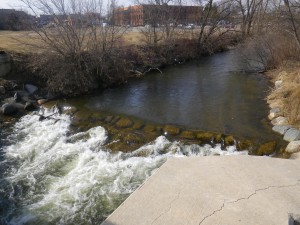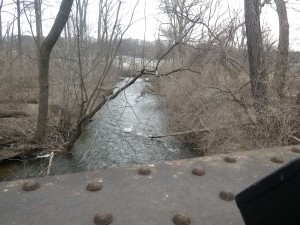New Approach to Stormwater Management in the Paint Creek Watershed
In 2003, Michigan developed the country’s only watershed-based municipal stormwater general permit. The permit required, for the first time, that cities with populations between 50,000 and 100,000 control stormwater coming out of their systems. Before the permit was finalized, the Clinton River Watershed Council (CRWC) convened the municipalities in their watershed to discuss the upcoming stormwater permit requirements.
 This approach helped lessen anxiety about these new requirements and gave the municipalities a forum to discuss their questions and concerns, resulting in a majority of them opting to apply for the watershed-based permit, rather than one just based on their own jurisdiction. CRWC offered to take on two of the “minimum measures” in the permit: public education and outreach, and public involvement at a watershed-wide scale, for consistency and cost-effectiveness. The municipalities agreed to pay for this service.
This approach helped lessen anxiety about these new requirements and gave the municipalities a forum to discuss their questions and concerns, resulting in a majority of them opting to apply for the watershed-based permit, rather than one just based on their own jurisdiction. CRWC offered to take on two of the “minimum measures” in the permit: public education and outreach, and public involvement at a watershed-wide scale, for consistency and cost-effectiveness. The municipalities agreed to pay for this service.
River Network admired the Michigan watershed-based permit approach and the efforts of CRWC to make it work smoothly for the permittees. For that reason, River Network asked the CRWC to join forces on a project that was intended to focus on the effectiveness of the watershed permit in order to share lessons learned, replicable strategies, and methods for the possible adoption of such a permit in other states.
River Network, together with CRWC, Charles River Watershed Association, ECONorthwest and Nature’s Voice, Our Choice worked with local officials in Rochester and Rochester Hills, Michigan from Spring 2011 to Summer 2013 to identify opportunities to involve Paint Creek (a tributary of Clinton River and the last naturally-reproducing trout stream in southeastern Michigan) in municipal decisions about stormwater management, road improvements and planning for more intentional connection to the Creek in both cities.
 The team applied Charles River Watershed Association’s (CRWA) Blue Cities® approach, starting with examination of the historical hydrology in Paint Creek watershed and proposing improved green infrastructure practices to better mimic the historical patterns and timing of flows.
The team applied Charles River Watershed Association’s (CRWA) Blue Cities® approach, starting with examination of the historical hydrology in Paint Creek watershed and proposing improved green infrastructure practices to better mimic the historical patterns and timing of flows.
The analysis identified places where green infrastructure solutions could improve management of the stormwater, enhance the riparian corridor, and improve human connections to the Creek. The team examined historic hydrology, stormwater system conveyance, historic, current and potential land uses, municipal infrastructure investment, community values, treatment costs, green infrastructure benefits, energy costs, and climate impacts to make recommendations in three locations to the cities and local landowners.
The project focused on three specific locations in the subwatershed that represented different opportunities to influence municipal decisions: private development along the riparian corridor, public investment in road improvements and improvements to municipal facilities situated adjacent to the Creek.
River Network requested a meeting with the private owners and developers of important, centrally-located vacant parcels in Rochester in order to convey project ideas and influence the negotiations associated with the near-term riparian development.
CRWC applied for, and received, three years of funding from one of their core funders, the Fred A. and Barbara M. Erb Family Foundation, to build on the ideas from the original project and their long-term fee-for-service municipal stormwater permit work throughout the Clinton River watershed. With the funds, they hired a local planner to focus on increasing watershed-based planning, especially around stormwater management opportunities in the cities most connected to Clinton River and its tributaries. They started their new project, named “Water Towns”, with Rochester and Paint Creek.
Many thanks to the Fred A. and Barbara M. Erb Family Foundation and U.S. EPA Region V for supporting this work.
Learn More
Jaymes Vettraino, City Manager, Rochester, MI
Jaymes Vettraino, City Manager, Rochester, MI
Michele Arquete-Palermo, Clinton River Watershed Council
Bryan Barnett, Mayor, Rochester Hills, MI
Bill Bohlen, Director, Department of Public Works, Rochester, MI




